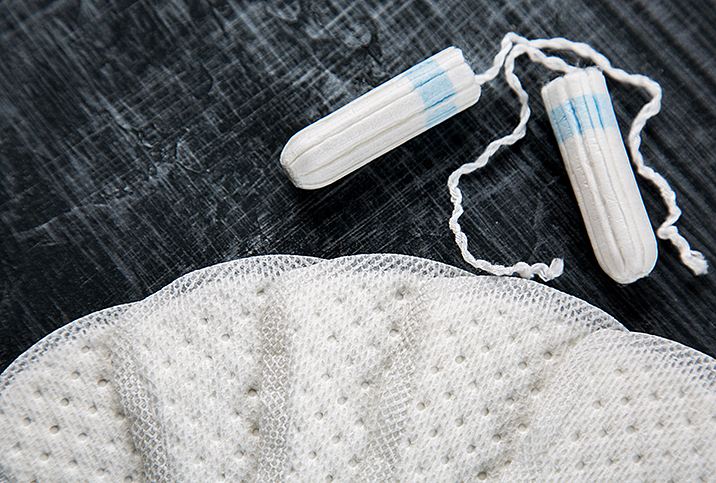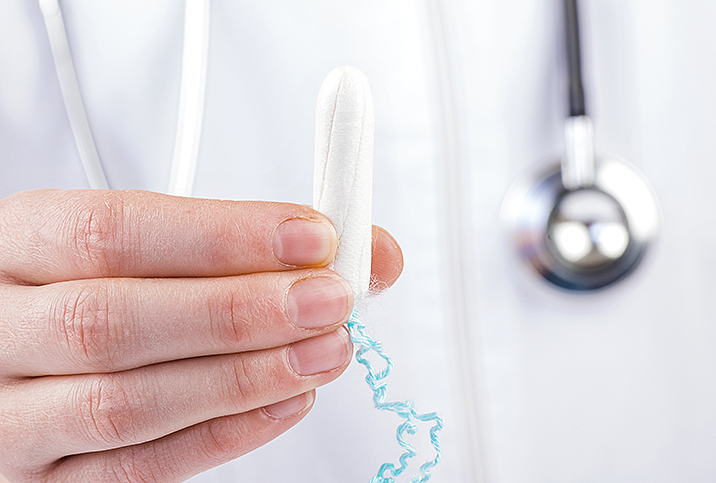How Toxic Shock Syndrome Really Feels

Attention: Tampons are associated with toxic shock syndrome (TSS). TSS is a rare but serious illness that may be fatal.
Above are the words written on the back of a Tampax box, read by the bored tampon user sitting on the toilet. Outside of these short statements, your average Joe is unlikely to know much more about TSS, if they've heard of it at all.
The condition, which affects around 1 in every 100,000 women ages 19 to 44 in the United States, is caused by Staphylococcus aureus (staph) or group A Streptococcus (strep) bacteria entering the bloodstream and releasing harmful toxins. Staph is relatively harmless to most people, with 20 percent to 30 percent of all humans carrying staph on their skin and nose with no negative effect, because many people have natural antibodies to protect them.
For people who can get TSS, 55 percent of cases are tampon-related, but it can affect any gender and can occur for various reasons, from pad use to infections of the skin.
"I had never heard of it at all before," said TSS survivor June Brooke, 22, from Delaware. "I'd never even seen it on a tampon box."
In March 2015, Brooke was a normal 16-year-old student who loved playing volleyball and going to school. She had been enjoying a vacation with her family, soaking up the last moments of sun in the hotel pool before leaving to go home. During the journey back, she started to feel unwell, suspecting food poisoning, and on returning home, fell asleep on the couch fully clothed.
Brooke hardly moved from this spot for the following 16 hours, only stumbling to the bathroom to throw up. "It felt like a dizzy fever dream," she said.
The following day, Brooke's mom found her on the couch, still wearing her jacket and boots from the night before and covered in various bodily fluids. She called an ambulance, but Brooke's health rapidly declined—she flatlined twice in the ambulance and once more at a local hospital. After numerous tests from perplexed doctors, she was eventually diagnosed with toxic shock syndrome.
Tampons themselves can become breeding grounds for bacteria when left in the body for too long, particularly super-absorbent tampons that often stay in longer.
The medical staff theorized that bacteria from the pool had made their way into Brooke's bloodstream through her tampon. One theory for TSS is that tampons can make tiny cuts on the vaginal wall which bacteria can enter through.
Tampons themselves can become breeding grounds for bacteria when left in the body for too long, particularly super-absorbent tampons that often stay in longer. Tampon users, therefore, are advised to use the lowest absorbency necessary and to keep them in for only a maximum of eight hours.
After Brooke's diagnosis, her condition was still unsteady, and once she had been stabilized, she was flown to the biggest hospital in Delaware, A.I. duPont children's hospital in Wilmington, where she was put in a medically induced coma.
"They told my parents to go get my sister and my grandmother…to say goodbye to me. They didn't think I was going to come out of it," Brooke said.
But after three days in the coma, she started to wake up.
"I said I was Donald Trump, I said I was Mickey Mouse, like I didn't know what was going on," Brooke said. "The doctors prepared my parents for permanent brain damage, since I was acting so crazy…About a day and a half later, I slowly regained me."
By the following Monday, a week after initially being admitted to the hospital, she was allowed to return home.
Awareness saves lives
Brooke shared her story in a viral TikTok post with 2.8 million views. She said, "I think it's so good nowadays to be able to share those kinds of stories, so if someone does [have TSS symptoms] you can tell them, 'Hey, you might have toxic shock.'"
This awareness is especially important with a condition such as TSS, which is uncommon and, therefore, often misdiagnosed. This was the case for 26-year-old Los Angeles-based singer Olivia Grace, who was sent home by doctors who missed her early signs of TSS.
Grace had checked herself into the hospital after a night of seemingly random projectile vomiting, nausea and fatigue. She told viewers in a TikTok post that "everything was yellow, everything felt like a dream." On returning home, she fell unconscious and remained that way until her landlord found her in bed 24 hours later and called an ambulance.
"TSS can kill you in about 48 hours, and I was unconscious for at least 24," she said. "By the time I was in the hospital, I had multi-organ failure." This included liver failure, kidney failure, a type 2 heart attack and a collapsed lung.
When strep or staph bacteria enter the body, they produce toxins that quickly multiply. The body reacts by shutting down its organs before the bacteria have the chance to do so. Due to the fast-paced nature of TSS, it is vital that you get checked out if you suspect you have the complication or start suffering early symptoms, such as fever, rash or low blood pressure, followed by chills, nausea and vomiting. The symptoms can also include confusion, which Grace suffered throughout her illness.
Awareness is especially important with a condition such as TSS, which is uncommon and, therefore, often misdiagnosed.
"I have brief memories of waking up in the hospital and being asked questions, such as if I knew my name or what year it was, and I didn't know any of the answers," she said. "I remember feeling really scared."
During her time in the hospital, Grace was given antibiotics for the infection, began dialysis for her kidney failure three times a week and had thoracentesis, a procedure to remove excess fluid and air from the lungs. As a result of being unconscious for so long when first falling ill, followed by weeks in bed, she became very weak and even walking became difficult for her. This meant she had to relearn to walk during physical therapy sessions.
"It was actually a requirement, in order for me to get discharged from the hospital, to at least be able to walk with a walker from the bed to the bathroom," Grace explained.
After several weeks in the hospital where she'd been unable to have visitors (due to the COVID-19 pandemic), she was finally able to go home.
She said: "When I saw my dad for the first time after leaving the hospital, I was overwhelmed with emotion. Like I could finally breathe and let go of some of the fear."
Grace has used her platform to spread awareness, documenting her experiences with TSS on TikTok, as well as educating her audience about the condition.
"Awareness saves lives," she said. "I've had people reach out and tell me that my videos have helped me catch early infections, including one person who had sepsis in their uterus—toxic shock is a rare form of septic shock. I wish more people knew that [although] TSS is rare, people still die from it annually. So if you have signs of a bacterial infection, don't wait to seek treatment."


















